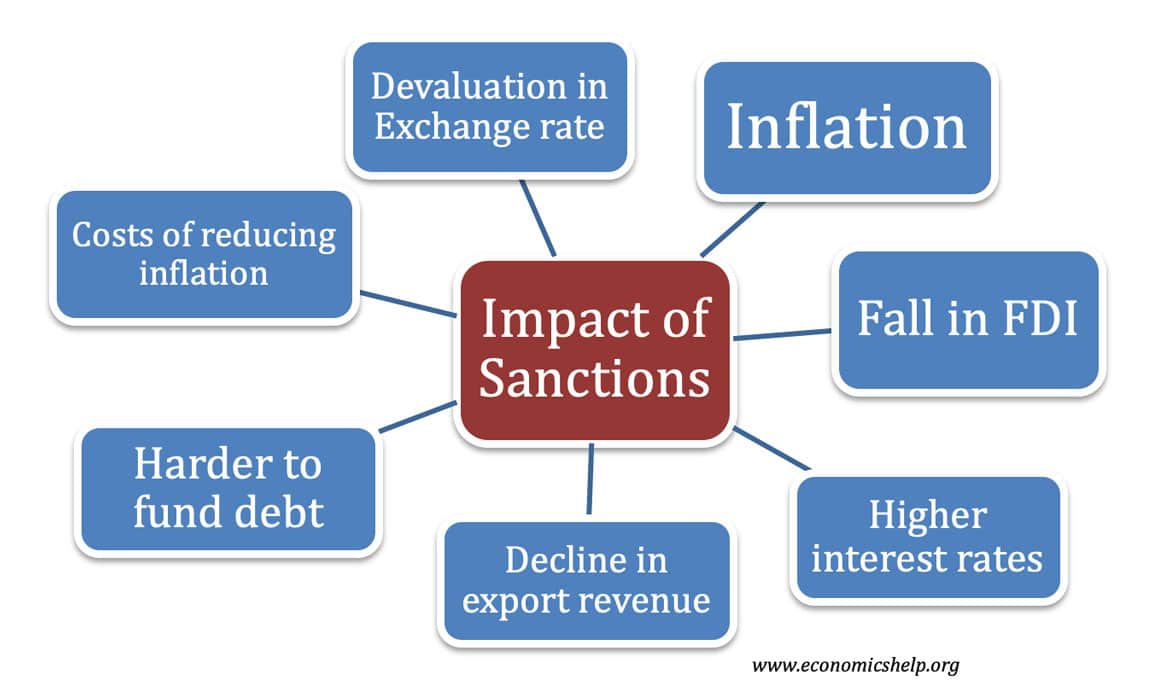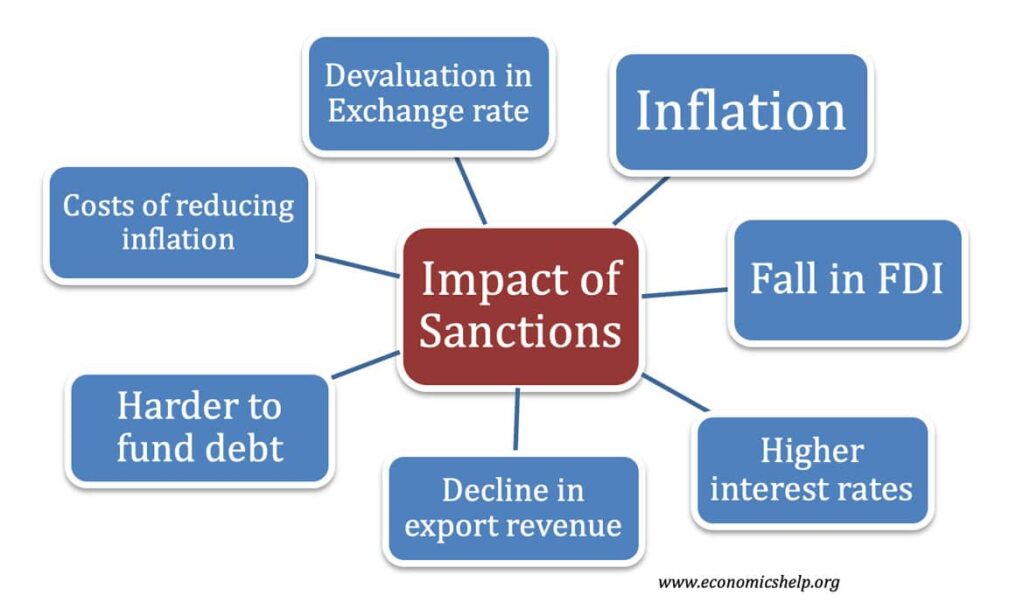When the U.S. imposed economic sanctions on Russia in 2014 following its annexation of Crimea, it caused ripples beyond the political sphere. These measures affected not only the sanctioned country but also had profound repercussions on the U.S. economy. It’s intriguing to note how interconnected global markets truly are.
Sanctions can often lead to unintended economic consequences, impacting anything from trade balances to global supply chains. For instance, U.S. farmers saw a significant decline in their export markets due to retaliatory sanctions. Such complexities underscore the significance of strategic decision-making in U.S. economic policy.

Background of Economic Sanctions
Historical Context
Economic sanctions have been used for centuries as a political tool. They were famously deployed during the Napoleonic Wars to weaken enemy economies. These sanctions often aim to change a country’s behavior without resorting to military action.
Reasons for Implementation
Countries impose sanctions for various reasons. Often, they target human rights abuses or acts of aggression. Sanctions can also be used to pressure nations to comply with international law.
Types of Economic Sanctions
There are several types of economic sanctions. Trade restrictions limit a country’s import and export abilities. Financial bans freeze assets and restrict transactions.
Effectiveness of Economic Sanctions
The success of sanctions can vary widely. In some cases, they effectively force changes in government policies. However, they can also harm ordinary citizens while leaving political leaders unaffected.
The Nature of Economic Sanctions
Economic sanctions are powerful tools used by countries to influence others without military action. These measures can affect trade, finances, and other key economic areas. Understanding their nature helps to grasp their impact on both the imposing and targeted nations.
Types of Economic Sanctions
There are various types of economic sanctions that countries can use. Trade sanctions limit a nation’s ability to export or import goods. Financial sanctions freeze assets and restrict access to financial markets.
Embargoes are another form, where all forms of trade and communication are halted. Secondary sanctions target third parties dealing with the sanctioned country. Each type serves a different strategic purpose.
- Trade Sanctions
- Financial Sanctions
- Embargoes
- Secondary Sanctions
Primary Goals of Sanctions
Sanctions often aim to change a country’s behavior. They might push for better human rights practices or discourage military aggression. In other cases, they serve to isolate politically unstable regimes.
Sanctions can also pressure countries into complying with international laws. For instance, the sanctions on Iran aimed to curb its nuclear program. Such measures require international cooperation to be effective.
Successful sanctions frequently depend on the involvement of multiple nations for maximum impact.
Examples of Economic Sanctions
Historically, economic sanctions have influenced major geopolitical outcomes. The sanctions against South Africa pressured it to end apartheid. Similarly, sanctions on North Korea aim to stop nuclear weapon development.
Countries like Russia and Cuba have faced prolonged sanctions for political reasons. The impact of these measures often varies, influencing both the target nation and global markets. Understanding past examples provides insights into their potential effectiveness.
Here is a table showcasing some important examples:
| Country | Reason for Sanctions |
|---|---|
| South Africa | Apartheid |
| North Korea | Nuclear Weapons Program |
| Russia | Annexation of Crimea |
| Cuba | Communist Regime |
Economic Sanctions and the U.S. Economy: An Overview
Economic sanctions serve as a strategic tool for the U.S., aiming to influence international politics effectively. These measures often target countries involved in activities contrary to U.S. interests. Sanctions can affect the U.S. economy in several significant ways.
One of the primary impacts is on U.S. businesses that trade with sanctioned countries. Companies can lose valuable markets and face increased operational costs. Industry-specific sanctions can also disrupt supply chains.
Financial markets can experience volatility due to sanctions. Investors may become wary of risks associated with certain stocks and bonds. This uncertainty can lead to broader economic instability.
Sanctions also alter global oil prices, which directly impacts energy costs in the U.S. Oil supply disruptions can lead to price hikes and influence inflation rates. By understanding these effects, policymakers can better navigate the complex landscape of economic sanctions.
Economic Sanctions: Impact on Trade
Economic sanctions significantly disrupt international trade. When a country faces sanctions, it struggles to export and import goods. This limits its economic growth and can lead to shortages.
The restricted access to global markets harms the targeted country’s economy. Businesses may shut down or operate at a reduced capacity. Trade partners often need to find new suppliers or markets.
Countries that impose sanctions also feel the economic pinch. U.S. farmers, for example, lost significant export opportunities to Russia due to sanctions. Such disruptions can affect various sectors of the economy.
- Loss of export markets for businesses
- Rising costs for finding new suppliers
- Unemployment in affected industries
Sanctions can sometimes benefit certain industries. Companies producing alternative goods may see increased demand. However, the overall economic effect is often negative.
Here’s a table showing the impact of sanctions on trade:
| Consequences | Targeted Country | Imposing Country |
|---|---|---|
| Reduced Exports | High | Moderate |
| Increased Costs | High | High |
| Supply Chain Disruptions | Significant | Significant |
Effects on Domestic Industries
Economic sanctions don’t just impact targeted countries; they also affect domestic industries. U.S. farmers have felt a significant pinch from sanctions against countries like Russia. Loss of export markets can lead to surplus products and falling prices.
The energy sector also faces challenges due to sanctions. Restrictions on oil exports can cause price hikes, affecting both producers and consumers. Energy companies may struggle to find new markets and customers.
Manufacturing industries often face supply chain disruptions. With restricted access to key materials, production costs can rise. Companies might have to look for alternative suppliers, increasing expenses.
Sanctions can sometimes benefit certain sectors. For example, industries producing substitute goods may see increased demand.
- Alternative suppliers gaining market share
- Higher demand for domestic products
- Increased investments in local industries
| Industry | Impact |
|---|---|
| Agriculture | Loss of export markets |
| Energy | Price hikes and production challenges |
| Manufacturing | Supply chain disruptions |
Implications for U.S. Foreign Policy
Economic sanctions play a critical role in shaping U.S. foreign policy. They serve as a tool to exert pressure on countries that defy international laws or threaten U.S. interests. Sanctions signal the U.S. stance without resorting to military action.
By imposing sanctions, the U.S. aims to change the behavior of targeted nations. This method can isolate regimes and weaken them economically. Diplomatic relationships can be strained but serve to highlight global issues.
Foreign policy decisions around sanctions require careful consideration. They involve balancing national security with economic impacts. Successful sanctions often depend on international cooperation.
At times, these measures can lead to unintended consequences. For example, sanctions may backfire and harm U.S. businesses. Allies may also disagree with the sanctions, causing diplomatic rifts.
| Aspect | Implication |
|---|---|
| Behavior Change | Targeted nations may alter policies |
| Diplomacy | Can strain or strengthen alliances |
| Economic Impact | Affects both U.S. and target economies |
Repercussions on Global Economy
Economic sanctions can have far-reaching effects on the global economy. When major economies impose sanctions, global trade patterns shift. This disruption affects international markets and economic stability.
Countries not directly involved in sanctions may also suffer. For example, nations relying on sanctioned goods must find new suppliers, raising costs. The ripple effect impacts global supply chains and prices.
| Impact | Example |
|---|---|
| Trade Patterns | Shifting due to restricted access |
| Supply Chains | Increased costs for alternative sources |
| Economic Stability | Affected by market volatility |
Multinational corporations often face significant challenges due to these disruptions. They may have operations or investments in countries under sanctions. Adjusting strategies becomes essential for minimizing losses.
The financial sector also feels the impact of economic sanctions. Banks might need to halt transactions with certain countries, affecting international financial flows. Global investors sometimes pull back, preferring more stable environments.
- Increased operational costs for businesses
- Diversification of supply chains to avoid dependencies on sanctioned regions
- Pooled investments shifting away from high-risk areas
- Development of advanced monitoring technologies
- Increased focus on humanitarian impacts
- Strengthening international alliances for multilateral efforts
Future Outlook and Perspectives: U.S. Economic Sanctions
The future of U.S. economic sanctions is likely to evolve in response to global political shifts. Emerging technologies could play a role in how sanctions are implemented and monitored. The U.S. may also continue to use sanctions as a strategic tool in international conflicts.
There’s a growing focus on the impact of sanctions on humanitarian issues. Policymakers may look to create more targeted sanctions that minimize harm to civilians. This approach seeks to balance pressure on governments while reducing suffering.
International alliances are crucial for effective sanctions. Cooperation with allies can enhance the impact and legitimacy of these measures. Multilateral sanctions are often more successful than unilateral ones.
Economic factors will also influence future sanction strategies. The U.S. needs to consider its own economic stability while imposing sanctions. Industries affected by sanctions may lobby for or against specific measures.
The effectiveness of future sanctions will hinge on their design and implementation. Policymakers must weigh the benefits against potential repercussions. By adapting strategies, the U.S. can continue to leverage sanctions in a complex global landscape.
Frequently Asked Questions
Economic sanctions are a critical tool in international politics. Below, we address some common questions about their impact on the U.S. economy and global trade.
1. How do economic sanctions affect global trade?
Economic sanctions disrupt global trade by limiting access to key markets. Countries under sanctions often struggle to export goods, leading to economic instability. Both the targeted nation and its trading partners suffer from these disruptions.
Moreover, secondary effects can ripple through supply chains worldwide. Other countries might need new suppliers, increasing costs for businesses globally.
2. Are there any benefits for the U.S. from imposing economic sanctions?
Imposing economic sanctions can provide strategic benefits. They allow the U.S. to exert pressure without military action, aiming to change undesirable behaviors in other countries.
This strategy also signals a firm stance on issues like human rights and nuclear proliferation. It helps maintain global stability when used effectively with international support.
3. What industries in the U.S. are most affected by economic sanctions?
The agricultural sector is significantly affected by economic sanctions due to lost export markets. Farmers may experience surplus products and falling prices, impacting their income.
The energy sector also faces challenges such as price hikes due to restricted oil exports, causing broader implications for production costs and consumer prices.
4. How do economic sanctions impact U.S.-Russia relations?
Sanctions have strained U.S.-Russia relations significantly over recent years. They aim to curb Russia’s geopolitical activities but result in diplomatic tensions between both nations.
This strain extends into various sectors such as energy and agriculture, disrupting established trade relationships and impacting bilateral cooperation on numerous fronts.
5. Can economic sanctions cause unintended consequences?
Economic sanctions can lead to unintended consequences like harming civilian populations rather than political leaders. These measures can sometimes exacerbate humanitarian crises within targeted nations.
Additionally, allied nations may disagree with certain sanction policies, causing diplomatic rifts and potentially weakening international alliances essential for comprehensive enforcement of these measures.
Conclusion
Economic sanctions are a powerful tool in shaping international relations and influencing global politics. They have significant impacts on both the U.S. economy and the economies of targeted nations. Understanding their complexities is crucial for policymakers.
While sanctions aim to promote positive change, they can also lead to unintended consequences. Careful implementation and international cooperation are key to their success. The evolving nature of global politics will continue to shape how sanctions are used in the future.

